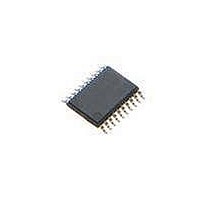P89LPC972FDH,129 NXP Semiconductors, P89LPC972FDH,129 Datasheet - Page 25

P89LPC972FDH,129
Manufacturer Part Number
P89LPC972FDH,129
Description
MCU 80C51 8KB FLASH 20TSSOP
Manufacturer
NXP Semiconductors
Series
LPC900r
Datasheet
1.P89LPC970FDH129.pdf
(66 pages)
Specifications of P89LPC972FDH,129
Program Memory Type
FLASH
Program Memory Size
8KB (8K x 8)
Package / Case
20-TSSOP
Core Processor
8051
Core Size
8-Bit
Speed
18MHz
Connectivity
I²C, SPI, UART/USART
Peripherals
Brown-out Detect/Reset, POR, PWM, WDT
Number Of I /o
18
Ram Size
256 x 8
Voltage - Supply (vcc/vdd)
2.4 V ~ 5.5 V
Oscillator Type
Internal
Operating Temperature
-40°C ~ 85°C
Processor Series
P89LPC
Core
80C51
Data Bus Width
8 bit
Data Ram Size
256 B
Interface Type
I2C, SPI, UART
Maximum Clock Frequency
18 MHz
Number Of Programmable I/os
15
Number Of Timers
5
Operating Supply Voltage
2.4 V to 5.5 V
Maximum Operating Temperature
+ 85 C
Mounting Style
SMD/SMT
3rd Party Development Tools
PK51, CA51, A51, ULINK2
Minimum Operating Temperature
- 40 C
Lead Free Status / RoHS Status
Lead free / RoHS Compliant
Eeprom Size
-
Data Converters
-
Lead Free Status / Rohs Status
Lead free / RoHS Compliant
Other names
935290299129
NXP Semiconductors
P89LPC97X
Product data sheet
7.16.1.1 Quasi-bidirectional output configuration
7.16.1.2 Open-drain output configuration
7.16.1 Port configurations
7.16 I/O ports
The P89LPC970/971/972 has four I/O ports: Port 0, Port 1 and Port 3. Ports 0, 1 are 8-bit
ports, and Port 3 is a 2-bit port. The exact number of I/O pins available depends upon the
clock and reset options chosen, as shown in
Table 7.
All but three I/O port pins on the P89LPC970/971/972 may be configured by software to
one of four types on a bit-by-bit basis. These are: quasi-bidirectional (standard 80C51 port
outputs), push-pull, open drain, and input-only. Two configuration registers for each port
select the output type for each port pin.
Quasi-bidirectional output type can be used as both an input and output without the need
to reconfigure the port. This is possible because when the port outputs a logic HIGH, it is
weakly driven, allowing an external device to pull the pin LOW. When the pin is driven
LOW, it is driven strongly and able to sink a fairly large current. These features are
somewhat similar to an open-drain output except that there are three pull-up transistors in
the quasi-bidirectional output that serve different purposes.
A quasi-bidirectional port pin has a Schmitt trigger input that also has a glitch suppression
circuit.
The open-drain output configuration turns off all pull-ups and only drives the pull-down
transistor of the port driver when the port latch contains a logic 0. To be used as a logic
output, a port configured in this manner must have an external pull-up, typically a resistor
tied to V
An open-drain port pin has a Schmitt trigger input that also has a glitch suppression
circuit.
Clock source
On-chip oscillator or watchdog
oscillator
External clock input
Low/medium/high speed
oscillator (external crystal or
resonator)
1. P1.5/RST can only be an input and cannot be configured.
2. P1.2/SCL/T0 and P1.3/INT0/SDA/T4 may only be configured to be either input-only or
open-drain.
DD
.
Number of I/O pins available
All information provided in this document is subject to legal disclaimers.
Rev. 3 — 8 June 2010
8-bit microcontroller with accelerated two-clock 80C51 core
Reset option
no external reset (except during
power-up)
external RST pin supported
no external reset (except during
power-up)
external RST pin supported
no external reset (except during
power-up)
external RST pin supported
Table
P89LPC970/971/972
7.
© NXP B.V. 2010. All rights reserved.
Number of I/O
pins (20-pin
package)
18
17
17
16
16
15
25 of 66















